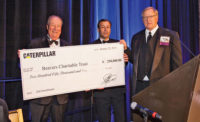One of Bob Bowen’s early leadership lessons was that you can’t do everything yourself. After graduating from Purdue University in 1962, he moved to California to work as a project engineer at W.M. Lyles Co., in Fresno. Just before Lyles was to renovate 22 canal bridges in 30 days, the superintendent quit. The young Hoosier immediately jumped in and ran the job.
“My boss was not happy with the way I ran it, but it was good experience for me,” says Bowen, now 76, who adds that youth, ego and adrenaline kept him motivated.
“I wasn’t the world’s greatest leader,” he admits. “What I learned was that I should have developed a team. I was a 25-year-old Purdue grad, and I thought I was the smartest guy in the world.”
He took that lesson back home to Indianapolis and, in 1967, started up his own construction company, Bowen Engineering Corp., armed with a $180,000 winning low bid to build a sewage-treatment plant. This time, he carefully assembled his team. Bowen obtained bonding, purchased a pickup truck, hired a superintendent and enlisted union carpenters. The firm has since worked on more than 1,000 treatment plants across the U.S., branching out into energy construction, and last year was ranked 254th on ENR’s Top 400 Contractors list, with $244.7 million in annual revenue. Bowen, who expects his firm to reach $300 million this year, attributes much of the success to empowering the firm’s 200 full-time employees, half of whom are engineers and many are company stockholders.
Everyone is expected to be a member of “the compliment-a-day club,” Bowen cheerfully explains, adding that positive attitudes help the firm win work. “Our project manager is not just delivering a concrete tank; he’s building a relationship with that client.”
Owners recognize Bowen engineers for their work ethic and honesty, too. “I hire them any chance I get,” notes Brad Talley, superintendent of water pollution control in Lafayette, Ind. “They are on the up-and-up, and that starts with Bob.”
Bowen stepped down in 2009 as CEO to allow his son, Doug, to run the business, but he continues to mentor the staff. Outside of the firm, Bowen is teaching future engineers how to build teams. Every fall since 2010, he drives twice a week to Purdue’s campus in West Lafayette, Ind., to teach a senior-level class in leadership and advanced project management.
Meanwhile, he and others have been on a cross-country mission to raise more than $1 million to fund a full-time “professor of practice”—a teaching expert like Bowen—at the school’s College of Engineering. Bowen donated $100,000 to seed the fund, which has grown to $1.2 million and began supporting its first fellow last fall. Nonetheless, Bowen still volunteers in the classroom.
“He’s not only spending his money, he is spending his time and talent,” says Jeffrey Russell, a professor at University of Wisconsin-Madison and Purdue grad who also donated to the cause. “At this point in his career, a lot of people are too busy golfing. Instead, he is with 25 to 35 students on Tuesday and Thursday nights.”
Martin Jischke, who served as president of Purdue from 2000-07, comments that Bowen “is a very energetic guy.” During the past-president’s tenure, Purdue built the $11-million Robert L. and Terry L. Bowen Laboratory, a structures-research facility for which Bowen and his wife donated $3.25 million. “He is a builder in a far broader sense,” Jischke says.
Bowen’s legacy reaches far beyond West Lafayette. In 1994, he and his wife created the Bowen Family Foundation, which provides scholarships to minority students enrolled in vocational schools. To date, the endowment has awarded $2 million to some 700 needy craft trainees, many of them African-Americans.
“The objective is to get them skills and jobs,” says Bowen, adding that more than 85% of the recipients are graduating and entering the workforce.
In 2002, Bowen and Jischke launched a charity called Science Bound, which helps underprivileged schoolchildren at Indianapolis Public Schools attend Purdue. Although they had hoped the program would help funnel more minorities into engineering, some students have taken other learning paths. “It hasn’t grown as much as we had hoped, but it has had an impact,” Jischke says. “There are students from IPS studying at Purdue, and some have graduated.”
Bowen in 2014 was inducted into the National Academy of Construction and is president of the Associated General Contractors of America’s Education and Research Foundation, where he is collecting business case studies for construction. The idea stemmed from his classroom use of a 1980 paper about Turner Construction—the only Harvard study he could find relevant to the industry.
“We’re hopeful to be a clearinghouse, like Harvard is, for the construction business,” he says.
Additionally, Bowen is writing a book about how to start up a construction company. He has three chapters knocked out and is meeting with a writing coach—once again recognizing that it takes more than one person to make a project successful.







Post a comment to this article
Report Abusive Comment